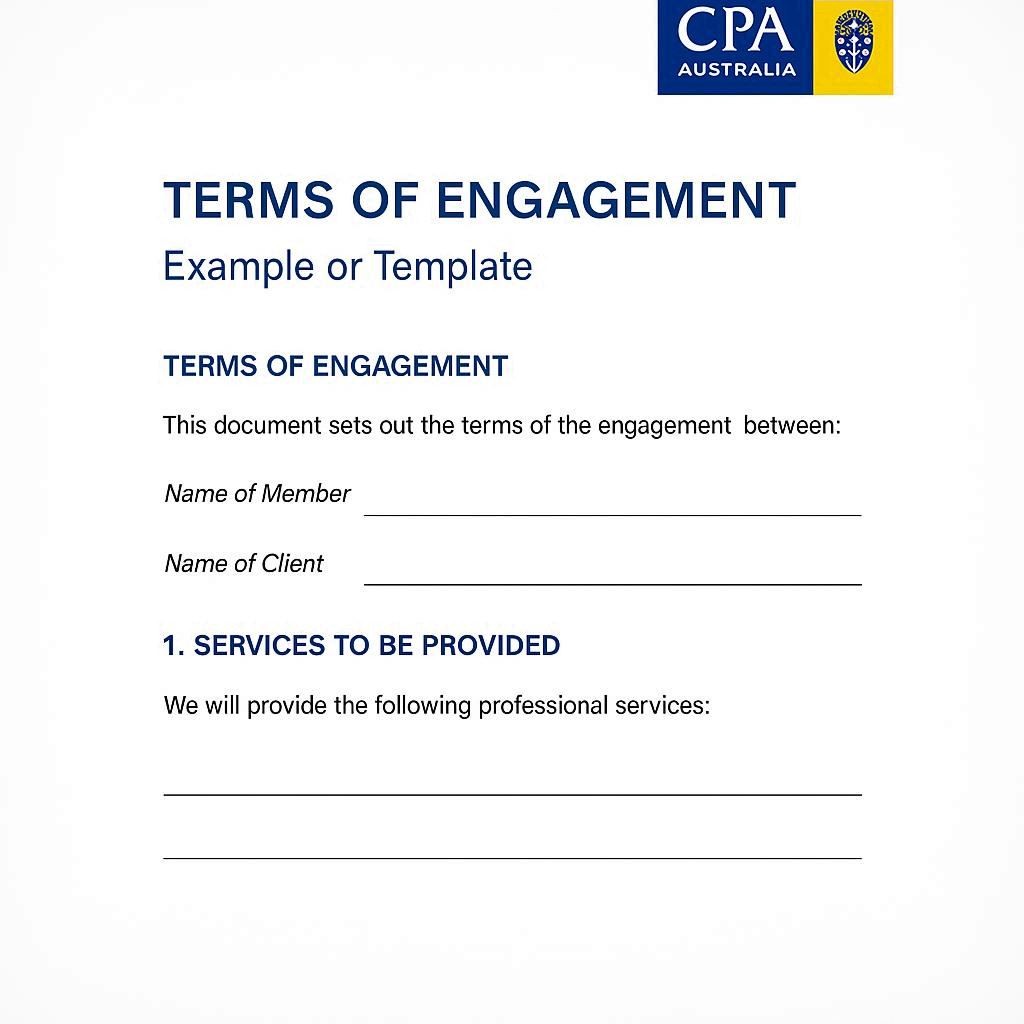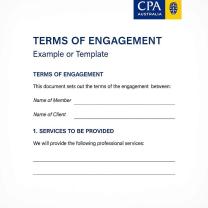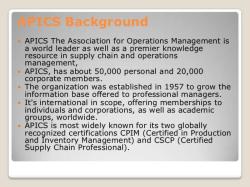Is there a terms of engagement template available for CPA Australia?
Yes — CPA Australia does provide Terms of Engagement templates. These are customizable and cover various types of professional services. Examples include:
A general Terms of Engagement template suitable for a wide range of services CPA Australia+1.
Specific templates for different service areas, such as:
Taxation services CPA Australia,
Assurance services CPA Australia,
SMSF audit engagements CPA Australia,
Audit of solicitor’s trust account engagements CPA Australia,
Compilation services CPA Australia,
Valuation services CPA Australia.
To access these, you'd typically download the relevant .docx template from CPA Australia’s website and tailor its content to suit your specific client engagement.
Additional Context — APES 305
It’s also important to note that APES 305 – Terms of Engagement is an accounting professional and ethical standard that mandates documenting and communicating the terms of engagement with clients. This standard outlines key elements that should be included in an engagement document, such as:
Purpose and scope of the engagement
Responsibilities of the member, client, and third parties
Fees and billing arrangements
Ownership of documents and data
Client confirmation that terms are understood CPA Australia
Templates from CPA Australia are designed with APES 305 requirements in mind.
Summary
| Feature | Availability |
|---|---|
| General-purpose Terms of Engagement template | Yes |
| Service-specific templates (tax, audit, valuation, etc.) | Yes |
| Compliant with APES 305 guidance | Yes |
What Should a Terms of Engagement Include for CPAs?
A comprehensive terms of engagement document, often called an engagement letter, is a crucial legal and ethical tool for CPAs.
Parties Involved: Clearly state the names of the accounting firm and the client(s) involved in the agreement.
Scope of Services: This is arguably the most important section. It must explicitly define the services being provided (e.g., tax preparation, bookkeeping, auditing, financial advice) and, just as importantly, what services are not included.
This prevents "scope creep." Period of Engagement: Specify the timeframe for which the agreement is valid, which may be a specific financial year, until a project is completed, or on an ongoing basis until terminated.
Fee Structure: Detail how fees will be calculated (e.g., fixed fee, hourly rate) and the payment terms.
This section should also cover any additional costs or disbursements that may be charged. Client Responsibilities: Outline what the client is obligated to provide, such as accurate and timely financial information and records.
This clarifies that the client holds ultimate responsibility for the accuracy and completeness of their records. Professional Obligations: State the professional and ethical standards the CPA will adhere to, such as the APES 110 Code of Ethics and other relevant standards issued by the Accounting Professional and Ethical Standards Board (APESB).
Confidentiality and Privacy: Detail how client information will be handled, especially concerning the use of cloud computing or outsourced services, and include a clause on compliance with the relevant privacy acts.
Ownership of Documents: Clarify who owns the working papers and other materials produced during the engagement.
Typically, the CPA retains ownership of these materials. Termination Clause: Explain the conditions under which either party can terminate the engagement.
How Can Templates Help Standardize Client Agreements?
Templates are a vital tool for achieving standardization in client agreements. They provide a pre-structured framework that ensures all essential legal, ethical, and professional clauses are consistently included.
Consistency: Using a template ensures that every client receives an agreement that covers the same fundamental points, such as the scope of work, fees, and responsibilities. This consistency is critical for risk management and compliance.
Efficiency: Templates save time and effort.
Instead of drafting a new agreement from scratch for each client, a CPA can simply fill in the specific details for the new engagement. Compliance: CPA Australia's templates are designed to align with the latest professional standards, such as those from the APESB. This helps members ensure they are meeting their professional obligations and ethical requirements.
Clarity: By using standardized language, templates make it easier for both the CPA and the client to understand their respective rights and responsibilities.
Where to Find Official CPA Australia Templates?
Official CPA Australia templates are a member-exclusive resource.
How to Customize Engagement Letters for Different Clients?
While templates provide a solid foundation, they must be customized to fit each client's unique needs. The customization process involves tailoring the template to accurately reflect the specific engagement.
Specify the Scope: The most critical customization is defining the exact services you will provide.
A tax services template, for example, needs to be edited to specify if you're preparing individual tax returns, business activity statements (BAS), or both. Insert Client Information: Personalize the letter with the client's name, address, and contact information. Ensure you also correctly identify the client's legal entity (e.g., sole trader, partnership, company).
Define Fees and Payment: Clearly state the agreed-upon fee structure, whether it's a fixed price, a time-cost basis, or a combination. Include details on when invoices will be issued and the payment due date.
Address Specific Risks: If an engagement has specific risks, such as dealing with complex financial instruments or engaging with a client in a high-risk industry, you should add clauses to address these.
Include Third-Party Involvement: If you plan to outsource any part of the service or use third-party cloud-based software, you must clearly disclose this in the letter and specify where the data will be stored.
This is a crucial element for transparency and compliance with confidentiality standards.




